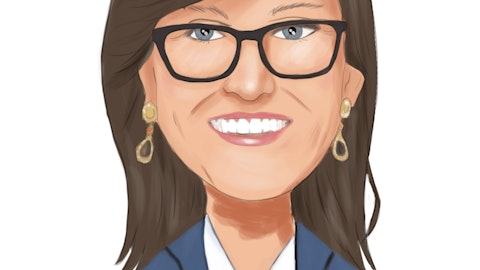And you compare that to Amazon and Google, they were both single-digit market share. So that’s kind of the big picture. I don’t know, Steve, if you want to take the second question?
Steve Louden : Yes. In terms of the second question on ARPU. Certainly, there is a difference in ARPU from the U.S. to international. The U.S. market is by far the part of this along in that shift to streaming, even though it’s still early days even in the U.S. And so the global ARPU that you see on the statements is really driven by the U.S. because many of our markets Internationally, we’re still focusing on driving scale and engagement, although we have notably in 2022, started to have additional markets that are monetizing. Mexico is a good case example where we’ve built up great scale, great engagement. And in 2022, we introduced the Roku Channel. And also, we started lighting up our ad business — our ad sales efforts there.
And so there is great progress on there on the ARPU side, but by its nature, it is at a much lower ARPU. But when we look at the trend sequentially, really, the story is around the macroeconomic environment. And some of the pressures on consumer spending and also the advertising business hitting the ARPU side of things. So that’s really the story here, although the U.S. international mix does come into play. But we’ve had that mix coming into play in subsequent, or in prior periods and the ARPU has still gone up until we had the scatter market pullback that we saw starting in mid-2022.
Operator: And our next question will be coming from Laura Martin of Needham.
Laura Martin : Hey, Anthony, one for you because it’s going to be mean. I don’t want to throw your guys out of the bus. So you just went into competition with your hardware manufacturers. And so what I want to know is, a, revenue upside from that because you said in your statement that you can do things when you own your own television that you can’t do when you’re licensing the OS to others. I’d like to understand what those upsides are. And secondly, I’d like to better understand, Anthony, how hard is it for some of those people you are currently the OS for to exit you and substitute TiVo or another independent operating system, which is one of the field they thought they got with Roku. Is that hard? Is it costly? Does it take a long time? So I’m looking at the monetary impact of you now competing with your licensees.
Anthony Wood : Thanks for the question. So let’s see. So first party the Roku-branded TVs. I think — if I think about kind of the big picture here. So first of all, I just mentioned the majority of our account growth is coming by — is coming from our Roku TV program. So it’s a super successful program it’s the Roku TV program has made us the #1 TV OS in the U.S. In Q4, like I said, 38% share bigger than Samsung and LG combined. You compare that to Google and Amazon, which have single-digit shares. Where just Roku is now the #1 TV OS in Canada in Q4, recently became the #1 TV OS in Mexico with about 30% share in Q4. So the program is doing great. In terms of our Roku-branded TVs. I’ll turn it over to Mustafa who’s on the call, Mustafa runs our device business and including the Roku program.


